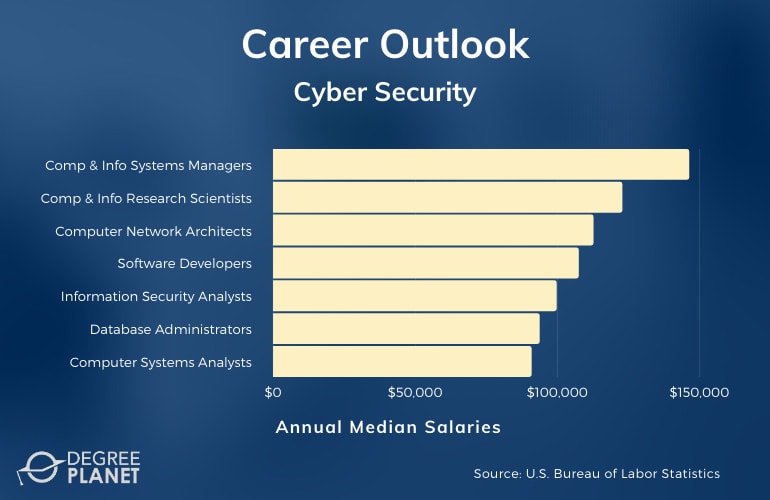Getting a masters degree can be a strategic way to make a career change, and earning a masters in cyber security online can help open the door to one of today’s fastest growing fields.

If you already have a background in computer science or a related field, a cybersecurity masters may offer career advancement and leadership opportunities.
Editorial Listing ShortCode:
Given the anticipated workforce demands, some online masters programs may have educators who are ready to encourage an unusually wide pool of applicants.
Online Masters in Cyber Security

As more information goes digital and migrates to the cloud or gets transmitted across the Internet, there’s a growing need for information security, cyber security, and cyber defense efforts across a wide range of enterprises.
Given these trends, it’s probably no surprise that many universities are getting on board too. You’re likely to find many accredited MS cyber security programs being offered both on campus and online by a range of schools.
Editorial Listing ShortCode:
An MS cybersecurity degree can typically be completed in 1 to 2 years at many schools, and obtaining one can help boost your qualifications or help you launch a new career. Graduates tend to pursue work in IT management, database administration, software development, information security, or similar job roles.
Cyber Security Masters Careers

As computers, the Internet, and machine learning become more and more a part of everyday life, the need for qualified cyber security support becomes increasingly urgent. Getting an online master’s in cybersecurity might be one of the quickest ways to snag a foothold in this exciting field.
Cybersecurity involves software research, design, and engineering. Management roles in this area relate to monitoring networks, protecting networks and databases, and analyzing and managing data assurances and cybersecurity risks.
According to the Bureau of Labor Statistics, cybersecurity careers and other IT-related careers can offer lucrative salaries.
| Careers | Annual Median Salaries |
| Computer and Information Systems Managers | $146,360 |
| Computer and Information Research Scientists | $122,840 |
| Computer Network Architects | $112,690 |
| Software Developers | $107,510 |
| Information Security Analysts | $99,730 |
| Database Administrators | $93,750 |
| Computer Systems Analysts | $90,920 |
| Computer Programmers | $86,550 |
| Network and Computer Systems Administrators | $83,510 |
| Web Developers and Digital Designers | $73,760 |
Information system managers or information security analysts can help private or public enterprises in a variety of industries, including healthcare, national defense, education, or finance.
These positions are especially critical in fields that plan and implement security tools and protocols for monitoring, assessing, and responding to cybersecurity threats. Leaders with administrative skills may be in consistent demand as companies need help navigating and keeping pace with evolving data security standards and data privacy laws.
Master’s in Cybersecurity Curriculum

The curriculum for a masters program will vary by school. Your courses will typically cover computer data systems and a range of principles and methods for safely storing, transmitting, and securing data as well as analyzing and managing cyber threats.
- Fundamentals of Cybersecurity: This course is a thorough introduction to software principles and protocols related to cybersecurity management. It is also an overview of cyber defense methods, tools, and threats.
- Information Network Security Management: You’ll learn about methods of risk analysis and about the tools and methods used to keep data and networks secure.
- Data Structures and Algorithms: You’ll learn about a range of data systems and processes. You’ll also learn about algorithm design and manipulation and about how algorithms are used for sorting and classifying information.
- Data and Network Assurance Analysis: This course explores how professionals in the field undertake the work of auditing information network systems and databases to test for vulnerabilities and report on network and database security features, risks, and threats.
- Cryptography: Topics in this course include methods used for encoding and decoding data to safeguard sensitive data and protect unwarranted access to data.
- Risk Assessment Management: This class explores best practices for assessing, monitoring, and managing risk and threats using objective and empirical methods.
- Cyber Threat Simulations and Forensics: A course like this could include hands-on learning about methods for limiting the damage done by cyberattacks and about forensic techniques to apply in the aftermath of cyberattacks.
- Biometrics: This course is an introduction to a range of biometric technologies and authentication modalities, including fingerprint reading, retina scans, and facial recognition. You may also study how biometrics fits into larger cybersecurity management designs.
- Machine Learning and Data Extraction: This course explores different machine learning technologies and data extraction processes as they relate to cybersecurity risks and strategies.
- Cyber Security Engineering: This course covers cybersecurity software design and their applications in diverse Internet and IT environments and networks.
Not all programs offer the same courses, but earning a Master of Science in Cyber Security is likely to be technically challenging. A master’s degree in cybersecurity online program can help you build expertise in this rapidly growing field.
Admissions

Admission to cybersecurity graduate programs typically requires a Bachelor of Arts or Bachelor of Science degree. Many schools want candidates to have a strong foundation in advanced math and computer science or computer engineering.
Admissions requirements and policies can vary by university, much as they do when entering a bachelor or associate degree in cybersecurity online program, but here’s what you’re likely going to need in order to apply to an online cybersecurity masters program:
- Bachelor’s degree
- Satisfactory college GPA
- GRE or GMAT scores, if required
- Completion of prerequisite coursework or specified work experience
Do you have strong aptitudes in math and science but worry you can’t check all the boxes when it comes to important prerequisites? You might find online masters programs at some universities that have built-in features designed to help you overcome these gaps.
Accreditation

When trying to find the school or program that best fits your needs, you may want to consider only fully accredited universities and cybersecurity graduate programs.
Regional accreditation helps ensure that the school you’re considering meets recognized standards for quality and that curriculum, instruction, and other academic resources and student services are likely in place to support your success.
By sticking with accredited schools and programs, it’s more likely your degree will be honored by other schools and prospective employers. Accreditation can also be an important factor if you plan to apply for financial aid.
The Council for Higher Education Accreditation (CHEA) has more information on accreditation and finding accredited schools.
Scholarships & Financial Aid

You’ll sometimes find less financial support available when applying for a masters program than you might have found when getting your first undergraduate degree. That said, you can likely still obtain student loans to help cover upfront costs, even if you don’t qualify for grants or need-based tuition.
There is some urgent demand for a growing cybersecurity workforce, so you may want to be on the lookout for workforce networks that offer tuition support, loan forgiveness, or other forms of aid. If you currently work in the field, you might qualify for employer-based tuition assistance.
If you anticipate having a financial gap when it comes to covering your enrollment costs, you can start by filling out the Free Application for Federal Student Aid (FAFSA).
What Can You Do with a Masters in Cyber Security?

An online cyber security master’s degree might seem like an overly specialized career path, but cyber security careers tend to intersect with a range of computer science, IT, and computer engineering pathways.
With growing concerns over rampant hacking and high-profile incidents involving malware, ransom attacks, and other cyber threats, acquiring expertise in cybersecurity might prove valuable for your long-term career horizon.
Careers in cybersecurity or related fields include information security analyst, software developer, database administrator, and computer and information systems manager.
Editorial Listing ShortCode:
According to the Bureau of Labor Statistics, the annual median salary for computer and information technology occupations is $88,240. A masters, though, can often qualify professionals for higher earnings. After gaining practical experience in the field, some find that earning a PhD in Cybersecurity online while also continuing to work often qualifies them for higher positions in their companies.
What’s more is that job growth for information security analysts is forecast to expand at the eye-popping rate of 31% over the next 10 years. This rate of growth is much faster than the average 4% job growth for all occupations.
What Is the Difference Between Cyber Security vs. Computer Science?

Cyber security is a more specialized branch of computer science. Getting a bachelor’s degree in computer science can create a solid foundation for someone aspiring to work in the cyber security field down the road.
Computer science focuses broadly on all aspects of computing, including computer networks, computer design, and computer processing and networking. Cyber security specialists need to learn many computer science concepts, but they are trained to provide support and expertise within the realm of cyber security.
Their tasks are often directly related to ensuring proper measures are in place to safeguard privacy and data security, to protect network integrity, and to manage or respond to external cyber security threats.
What Is the Difference Between Information Security vs. Cyber Security?

Broadly speaking, both information security and cyber security focus on the safeguarding of data.
Information security officers are likely to focus on the broad management and monitoring of both internal standards and protocols for assuring the protection, safe storage, and transmission of data. Information security work can include physically stored data as well as digital data.
Cyber security, on the other hand, only concerns itself with digital data. Cyber security especially focuses on preventing unauthorized access to data by external parties or safeguarding against threats to operating systems and IT networks themselves. Threats might result from hacks, malware, or cyber espionage.
What Is the Difference Between Network Security vs. Cybersecurity?

Network security is one area within cybersecurity work. Businesses and other organizations with large computing or IT networks are likely to have concerns about hackers or computer viruses allowing unwarranted access to their computer networks.
A compromised computer network can put both network functions and data stored or transmitted on the network at risk. Organizations that heavily rely on IT or information processing networks need to take extra precautions against attacks on their networks or be prepared to respond quickly.
Cybersecurity officers tend to focus their work on network security and data protection. They often have expertise for safeguarding against or responding to external threats, such as hacking, malware, ransomware, and cyber espionage.
Is a Masters Degree in Cyber Security Worth It?

Yes, a masters in cybersecurity is worth it for many professionals. Jobs in the information security field are expected to grow much faster than average over the next 10 years (Bureau of Labor Statistics). So, specializing in cybersecurity aspects of the computer science field can help open doors to exciting future prospects.
Editorial Listing ShortCode:
Getting a masters in a growing field can be a strategic career move for many people. Since some computer science and cybersecurity jobs might only require a bachelor’s degree, completing a masters degree can help give you a competitive boost.
Universities Offering Online Masters in Cyber Security Degree Programs
Methodology: The following school list is in alphabetical order. To be included, a college or university must be regionally accredited and offer cyber security degree programs online or in a hybrid format.

Depaul University offers an online Master of Cybersecurity program. Students may choose one of three concentrations: Networking and Infrastructure, Computer Security, and Governance, or Risk Management and Compliance.
To graduate, students must complete 52 credit hours. Applicants must have a minimum GPA of 2.5 and a bachelor’s degree in a relevant field.
DePaul University is accredited by The Higher Learning Commission.

Drexel University offers an online Master of Cybersecurity. To graduate, students must obtain 45 credit hours. Courses last for 10 weeks, and the program is divided into 4 semesters. To apply, applicants must have a bachelor’s degree in a relevant field, all official transcripts, a resume, and two letters of recommendation.
Drexel University is accredited by the Middle States Commission on Higher Education.

George Washington University offers an online Master of Cybersecurity. The program requires 30 credits and usually takes 2 years to complete.
Applicants must have a bachelor’s degree in engineering, computer science, business administration, or another relevant field with a GPA of 2.7 or higher. Those without a bachelor’s degree may still be eligible if they have professional experience.
George Washington University is accredited by the Middle States Commission on Higher Education.

John Hopkins University offers an online Master of Science in Cybersecurity. To graduate, students must complete 10 courses within 5 years of starting the program. Only one course with a C grade can count towards the degree requirements. Applicants must have a GPA of 3.0 or higher and undergraduate credits in calculus and Java.
The Johns Hopkins University is accredited by the Middle States Commission on Higher Education.

Liberty University offers an online Master’s in Cybersecurity. Courses last for 8 weeks. To graduate, students must obtain 36 credits. Students have the option to apply to transfer in up to half of the required credits. To be eligible, applicants must submit an application with any official college transcripts and proof of English proficiency.
Liberty University is accredited by the Southern Association of Colleges and Schools Commission on Colleges.

Maryville University offers an online Master of Cybersecurity. The program can typically be completed in 12 months. Students may choose to gain an emphasis in Leadership, Technical, or General. To graduate, up to 33 credits are required. Applicants are required to have a bachelor’s degree and no transfer credits from other universities.
The Maryville University of Saint Louis is accredited by The Higher Learning Commission.

New York University offers an online Master of Science in Cybersecurity. A Cyber Ops specialization is also available. Students can choose between completing a research project or a master’s thesis to graduate.
Applicants with an undergraduate’s degree in computer science or a related field must submit a statement of purpose and GRE score. Those without a relevant degree are required to take the Bridge Program.
New York University is accredited by the Middle States Commission on Higher Education.

The University of Dallas offers a Master of Science in Cybersecurity. The program requires 30 credit hours and can usually be completed in 2 years.
Applicants must submit a resume, transcripts, and either their GRE or GMAT scores. There are three prerequisites to the program as well: Foundations of Management & Strat, Foundations of Marketing, and Foundations of Cybersecurity.
The University of Dallas is accredited by the Southern Association of Colleges and Schools Commission on Colleges.

The University of Delaware offers an online Master of Science in Cybersecurity. The program can usually be completed in 2 years and requires 30 credits to graduate. Courses last for 7 weeks and begin in the summer, spring, and fall.
Applicants must have a bachelor’s degree with a GPA of 3.0, 3 letters of recommendation, and a minimum GRE score of 150.
The University of Delaware is accredited by the Middle States Commission on Higher Education.

The University of Southern California offers a Master of Science in Computer Science with a specialization in Computer Security. The program can typically be completed in 2 years and requires 32 credits to graduate. Students must maintain a GPA of 3.0 throughout the program. Applicants must submit all transcripts, their GRE scores, and a resume.
The University of Southern California is accredited by the Western Association of Schools and Colleges, the Senior College and University Commission.
Earning Your Cyber Security Masters Online

If you’re intrigued by the thought of changing careers and jumping into a fast-evolving field that can be technically challenging, then you may want to consider enrolling in a cybersecurity graduate program.
If you already have a degree or meaningful work experience in computer science or a related field, then a cybersecurity masters may help you advance your career and qualify for higher earnings.
Online cyber security masters programs offer you a chance to complete immersive learning and training within a well-defined time frame. Online programs also tend to offer more flexibility, whether you’re looking to have a part-time schedule or to finish at an accelerated pace.
You may find any number of accredited online cyber security master’s degree programs that are designed to help you get started as soon as possible!

